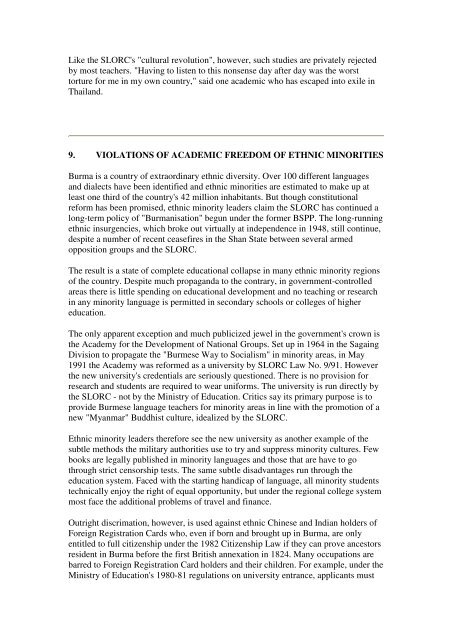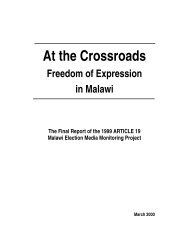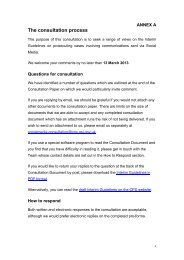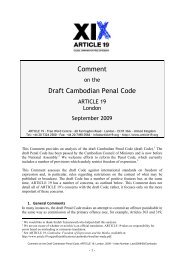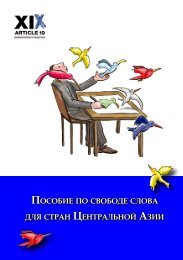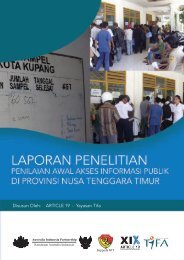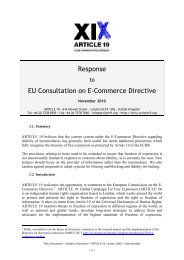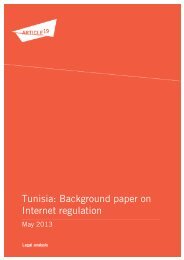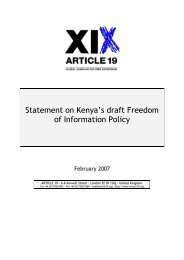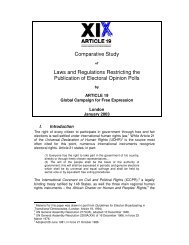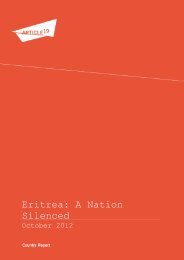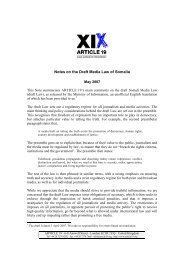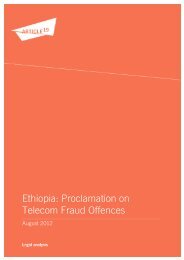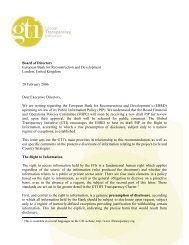"OUR HEADS ARE BLOODY BUT UNBOWED ... - Article 19
"OUR HEADS ARE BLOODY BUT UNBOWED ... - Article 19
"OUR HEADS ARE BLOODY BUT UNBOWED ... - Article 19
You also want an ePaper? Increase the reach of your titles
YUMPU automatically turns print PDFs into web optimized ePapers that Google loves.
Like the SLORC's "cultural revolution", however, such studies are privately rejectedby most teachers. "Having to listen to this nonsense day after day was the worsttorture for me in my own country," said one academic who has escaped into exile inThailand.9. VIOLATIONS OF ACADEMIC FREEDOM OF ETHNIC MINORITIESBurma is a country of extraordinary ethnic diversity. Over 100 different languagesand dialects have been identified and ethnic minorities are estimated to make up atleast one third of the country's 42 million inhabitants. But though constitutionalreform has been promised, ethnic minority leaders claim the SLORC has continued along-term policy of "Burmanisation" begun under the former BSPP. The long-runningethnic insurgencies, which broke out virtually at independence in <strong>19</strong>48, still continue,despite a number of recent ceasefires in the Shan State between several armedopposition groups and the SLORC.The result is a state of complete educational collapse in many ethnic minority regionsof the country. Despite much propaganda to the contrary, in government-controlledareas there is little spending on educational development and no teaching or researchin any minority language is permitted in secondary schools or colleges of highereducation.The only apparent exception and much publicized jewel in the government's crown isthe Academy for the Development of National Groups. Set up in <strong>19</strong>64 in the SagaingDivision to propagate the "Burmese Way to Socialism" in minority areas, in May<strong>19</strong>91 the Academy was reformed as a university by SLORC Law No. 9/91. Howeverthe new university's credentials are seriously questioned. There is no provision forresearch and students are required to wear uniforms. The university is run directly bythe SLORC - not by the Ministry of Education. Critics say its primary purpose is toprovide Burmese language teachers for minority areas in line with the promotion of anew "Myanmar" Buddhist culture, idealized by the SLORC.Ethnic minority leaders therefore see the new university as another example of thesubtle methods the military authorities use to try and suppress minority cultures. Fewbooks are legally published in minority languages and those that are have to gothrough strict censorship tests. The same subtle disadvantages run through theeducation system. Faced with the starting handicap of language, all minority studentstechnically enjoy the right of equal opportunity, but under the regional college systemmost face the additional problems of travel and finance.Outright discrimation, however, is used against ethnic Chinese and Indian holders ofForeign Registration Cards who, even if born and brought up in Burma, are onlyentitled to full citizenship under the <strong>19</strong>82 Citizenship Law if they can prove ancestorsresident in Burma before the first British annexation in 1824. Many occupations arebarred to Foreign Registration Card holders and their children. For example, under theMinistry of Education's <strong>19</strong>80-81 regulations on university entrance, applicants must


